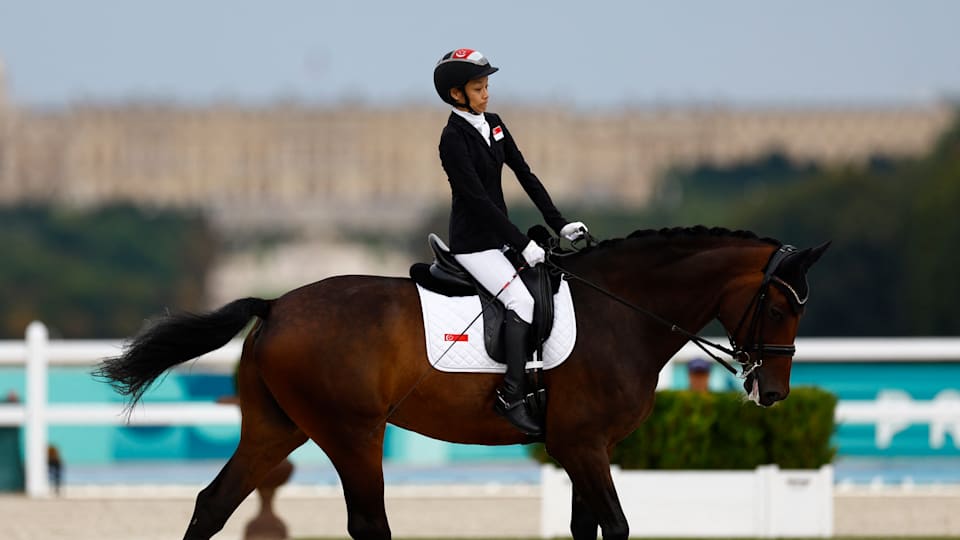Unable to hear, Para dressage great Laurentia Tan relies on her other senses to visualise music

Para equestrian rider Laurentia Tan cannot hear music she is competing to, so she paints a picture of the music instead.
The Singaporean athlete developed cerebral palsy and profound deafness soon after birth and discovered equestrian sport at age five. The horses, which Tan calls her "dance partners", helped her to find a new way to experience music and the world.
“I just love the horses. I love working with the horse," four-time Paralympic medallist Tan told Olympics.com through a sign language interpreter.
"The horses that I've had over time, they've just been amazing. They give me the freedom to do things that I can't do on my own. So when I'm riding, just to experience that freedom, working with them, that's what means the most to me."
Paris 2024 are the fifth Paralympic Games appearance for Singapore's Laurentia Tan.
Painting pictures of music with the help of scientists, dancers and musical fountains
Laurentia Tan competes in the Para equestrian grade I class, reserved for riders with the most severe impairments.
Due to cerebral palsy, it is challenging for Tan to use her legs to control a horse's movements. What makes riding even more difficult, however, is that she is not able to hear the music used during freestyle competitions.
The freestyle test is based on how well the riders and their horses can complete dressage figures choreographed to pre-selected music. Tan has found some creative ways to be successful in this event despite her hearing impairment, to the point of taking a silver medal in the individual freestyle at London 2012 and a bronze at Beijing 2008.
Putting science to good use, Tan wears a vibro-tactile vest during freestyle competitions, which helps her to interpret sounds through vibrations.
"I do have the SubPack, so I am able to feel some of the music sometimes," she explained. "You can kind of feel the vibrations through the vest."
Tan trusts her team to pick the best freestyle music for her competitions. The rider has also worked with musicians with hearing impairments to learn to feel music with senses other than hearing.
"They've helped me to translate the music, which is something I'm not able to hear," Tan said. "They can't hear the music, but what they can do is they can translate it into the emotion that it's conveying, the colours that it conveys to give me a visual picture so that then I can understand the story that the music is trying to tell me."
To understand music even better, Tan has studied the movements of ballet and contemporary dancers and the body language of orchestra conductors. Even musical water fountains and crowd reactions can give her clues about the notes she cannot hear.
When she paints her own pictures of musical scores, Tan re-imagines them through emotions, shapes, and cold or warm hues. She then carries these images into her freestyle Para dressage competitions.
"What I try to do is I try to picture what it is that I'm doing," she said. "I'm trying to imagine where I am within the arena, how that matches up to the music, to make sure I've got the timing in line with the music."
Laurentia Tan and her "cheeky" horses
While scientific advancements and advice from humans have helped Tan be at her best during Para dressage competitions, it is the horses who have been her closest and kindest allies on this journey.
"The horse has its own rhythm, so I have to trust him as well," Tan said of how horses help her during dressage tests. "He's trusting me to lead him and I'm trusting him, so it's that relationship we have working with each other."
Tan calls the horses her dance partners, each one with a character to match a specific dance style. This includes her horse at Paris 2024, the 12-year-old gelding Hickstead, who is nicknamed Coco in the stables.
"It does depend on their personality, but I think with Coco, maybe the jive. I think that would match his personality," Tan said with a laugh.
"He's quite cheeky but I do love him," she continued. "He is always looking for food, so if he thinks you have any food at all, he'll be there looking in your pocket trying to find if there's any food hidden anywhere."
The pair have been working together for about two years and finished fifth in the individual event – grade I at Paris 2024, which are the fifth Paralympic Games appearance for the Singaporean rider.
Tan's best Paralympic result was a silver in the individual freestyle – grade Ia event at London 2012. She also won bronze in the individual championship test – grade Ia at the 2012 Games, to add to her earlier bronze in the same event at Beijing 2008. That medal was the first Paralympic medal in Singapore's history and the first medal in a Para equestrian event at a Paralympic Games for an Asian athlete.
Tan picked up a second bronze in Beijing, in the individual freestyle – grade Ia event, two days after as well.
Competing on the Paralympic stage is always a great joy for the rider who has qualified for three events at Paris 2024.
"This is the pinnacle of the competition," Tan said. "You've got the best riders all in the same venue. You've got a beautiful venue in Paris – we won't have that opportunity to compete again here, so I just feel so privileged. I'm just thrilled to be here. It's just such an honour."